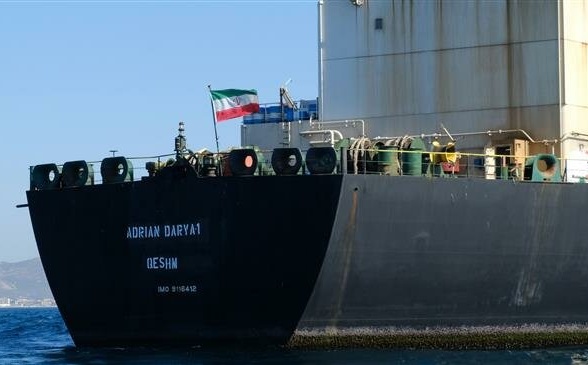The Iranian supertanker Adrian Darya 1, released by Gibraltar after pledge not to deliver oil to Syria, August 18, 2019
Iran’s officials are celebrating “victory” with the release of a detained supertanker, jabbing at the Trump Administration as ineffective in its sanctions and “maximum pressure” on Tehran.
The Iranian supertanker Adrian Darya 1, renamed and put under the Islamic Republic’s flag, was allowed to leave Gibraltar on Sunday with its 2.1 million barrels of oil. The vessel was boarded and impounded on July 4, with the UK claiming that it was breaking European Union sanctions by taking the oil to Syria’s Assad regime.
Iran had to give assurances to Gibraltar that the supertanker would not proceed to the Syrian port of Baniyas. On Monday, the vessel was tracked en route to Kalamata in Greece.
But the head of Iran’s military, Maj. Gen. Mohammad Baqeri, proclaimed on Monday that Tehran had triumphed with its downing of an American drone in June and — in retaliation for the impoundment of the Adrian Darya 1 — the seizure of the UK-flagged Stena Impero on July 19.
The shooting down of an intruding US spy drone and the seizure of the violating British oil tanker and finally, the release of our country’s tanker in Gibraltar, prove the fact that the Islamic Revolution strongly continues on its path to achieve its lofty goals.
In response to the downing of the US drone, Donald Trump approved but then withdrew the order for American airstrikes inside Iran. The US returned to “maximum pressure” through sanctions; however, Gibraltar rejected the Justice Department’s last-ditch attempt to take control of the Iranian supertanker.
On Monday, the Supreme Leader signaled to Washington as well as the Iranian people with a message to the Revolutionary Guards, “More power to your elbow. You accomplished a remarkable feat.”
And Secretary of the National Security Council, Ali Shamkhani, used an interview with US outlet ABC News to declare, “Just walk the streets of Tehran and see how energetic our people are and you will realize that [what the US has] been trying to achieve has not materialized.”
Stepping Back from Talks
With the regime emboldened by the turn of events, Foreign Minister Mohammad Javad Zarif stepped back from his offer last month of a negotiation with Washington.
On a diplomatic tour of New York, Zarif had suggested that Iran would halt its suspension of commitments under the 2015 nuclear deal, from which the Trump Administration withdrew in May 2018. In return, the US would pledge a permanent lifting of sanctions.
The offer was overtaken hours later by news of the Revolutionary Guards’ seizure of the Stena Impero tanker in the Strait of Hormuz. Despite the release of the Adrian Darya 1, the Swedish-owned vessel is still being held at the southern Iranian port of Bandar Abbas.
Zarif said on Monday in Helsinki, alongside Finland’s Foreign Affairs Minister Pekka Haavisto, “Iran is not interested in negotiations with the United States to clinch a new nuclear accord. We had detailed negotiations with the United States and it was not us who left the negotiating table.”
The Foreign Minister said any mediation “must primarily focus on how to make Washington resume fulfilling its obligations under the JCPOA [nuclear deal” and returned to pressure on European powers: “Despite America’s unilateral withdrawal from the JCPOA, Europe must remain committed to this agreement.”
After months of talks, in February the European Union launched a limited mechanism for non-dollar trade in Iranian oil and other goods and commodities. However, Tehran rejected the link — needed for its troubled economy — because of “humiliating conditions” such as the EU’s call for discussions on Iran’s missile program and criticism of Iranian activities in the Middle East and alleged involvement in bombing and assassination plots in Europe.
Shamkhani echoed the rejection of talks in his ABC News interview, “The sanctions campaign is not for negotiation, it’s for making us surrender. As long as this approach is taken by the United States, Iran will never ever seek negotiations.”
With the failure to establish the European economic link, Iran has broken the nuclear deal’s limit on stock of 3.67% uranium and has said it will resume enrichment of 20% uranium, which can be further enriched to 90% for a military nuclear program.
President Hassan Rouhani has also announced that Iran is resuming construction of the Arak nuclear reactor. Under the Joint Comprehensive Plan of Action, the facility was to be redesigned to prevent by-product of plutonium which could be used in nuclear weapons.


“Iran’s officials are celebrating “victory””
iri officials have been celebrating “victories” for 40 years and see what they have to show for it